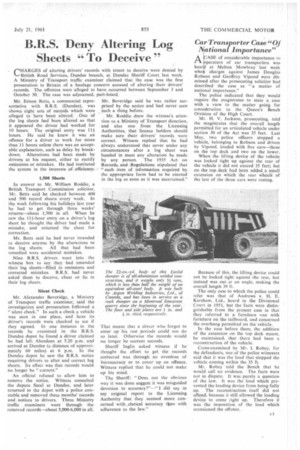B.R.S. Deny Altering Log Sheets "To Deceive"
Page 37

If you've noticed an error in this article please click here to report it so we can fix it.
CHARGES of altering drivers' records with intent to deceive were denied by 1--"British Road Services, Dundee branch, at Dundee Sheriff Court last week. A Ministry of Transport traffic examiner claimed that the case was the first prosecution in Britain of a haulage concern accused of altering their drivers' records. The offences were alleged to have occurred between September 3 and October 30. The case was adjourned, part-heard.
Mr. Ernest Betts, a commercial representative with B.R.S. (Dundee), was shown eight sets of records which were alleged to have been altered. One of the log sheets had been altered so that it appeared the driver had worked for 10 hours. The original entry was 111 hours. He said he knew it was an offence for a driver to work for more than 11 hours unless there was an acceptable explanation, such as delay by breakdown. Alterations had been made by drivers at his request, either to rectify omissions or mistakes. He had instituted the system in the interests of efficiency.
In answer to Mr. William Roddie, a British Transport Commission solicitor, Mr. Betts said he checked between 400 and 500 record sheets every week. In the week following his holidays last year he had to get through three weeks' returns—about 1,500 in all. When he saw the 111-hour entry on a driver's log sheet he thought the driver had made a mistake, and returned the sheet for correction.
Mr. Betts said he had never intended to deceive anyone by the alterations to the log sheets. All that had been remedied were accidental mistakes.
Nine B,R.S. drivers went into the witness box to say they had amended their log sheets—filled in omissions and corrected mistakes. B.R.S. had never asked them to deceive, cheat or lie in their log sheets.
Mr. Alexander Beveridge, a Ministry of Transport traffic examiner, said the investigation and prosecution followed a "silent check." In such a check a vehicle was seen in one place, and later its driver's records were checked to see if they agreed. In one instance in the records he examined in the B.R.S. Dundee depot he found a driver claimed he had left Aberdeen at 5.20 p.m. and arrived at Dundee (a distance of approximately 60 miles) at 6 p.m. In the Dundee depot he saw the B.R.S. notice requiring drivers to alter and correct log sheets. Its effect was that records would no longer be "current."
An official refused to allow him to remove the notice. Witness consulted the depute fiscal at Dundee, and later returned to the depot with a police constable and removed three months' records and notices to drivers. Three Ministry traffic examiners went through the removed records—about 5,000-6,000 in all.
Mr. Beveridge said he was rather surprised by the notice and had never seen Such a thing before.
Mr. Roddie drew the witness's attention to a Ministry of Transport direction, and also one from the Licensing Authorities, that licence holders should make sure their drivers' records were correct. Witness replied that he had always understood that never under any circumstances after a log sheet was handed in must any alteration be made by any person. The 1935 Act on Records and Regulations stipulated that "each item of information required by the appropriate form had to be entered in the log as soon as it was ascertained."
That meant that a driver who forgot to enter up his rest periods could not do so later. Otherwise the records would no longer be current records.
Sheriff Inglis asked witness if he thought the effort to get the records corrected was through an overdose of
bureaucracy or to cover up an offence. Witness replied that he could not make up his mind.
The Sheriff: "Does not the obvious way it was done suggest it was misguided devotion to accuracy?"—"1 did say in my original report to the Licensing Authority that they seemed more concerned with ,clerical accuracy tan with adherence to the law."
























































































































